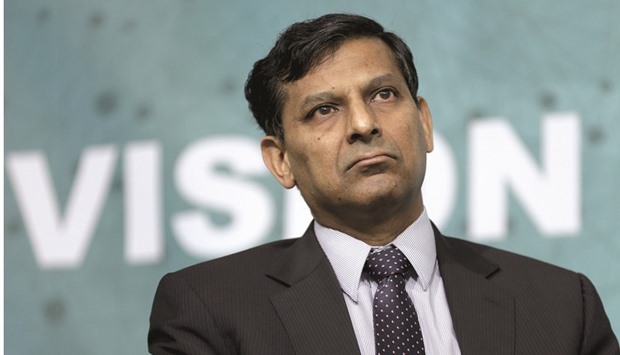Forget the headlines about tensions with India’s government: Raghuram Rajan is likely to stay on as India’s central bank governor after his term ends in September.
That’s the view of most economists in a Bloomberg survey on Thursday following criticism from several government officials over Rajan’s characterisation of India’s economic growth in a recent media interview. Thirteen of 15 economists said he’d get an extension, one said it’s unlikely and another said it could go either way.
“At this juncture he is steering both the monetary policy framework and the banking system towards greater transparency, credibility, efficiency and stability,” Sujan Hajra, a Mumbai-based economist at Anand Rathi Financial Services, said of Rajan. “Given this unfinished agenda and also the fact that all of the last four governors served five-year terms, we expect governor Rajan to get a two-year extension.” Rajan’s future is becoming a key point of speculation in India, which recently overtook a slowing China as the world’s fastest-growing major economy. Since taking charge of the central bank in 2013, the former International Monetary Fund chief economist has led the push for an inflation target, a monetary policy committee and moves to clean up the balance sheets of state-run banks.
While Prime Minister Narendra Modi’s government has largely endorsed Rajan’s moves, tensions have sprung up on occasion.Rajan’s speech last year on the need for tolerance in multicultural India drew a rebuke from a leading member of Modi’s ruling Bharatiya Janata Party, which has long represented the interests of India’s Hindu majority.
Last week Rajan also caused a stir when he used a proverb to characterise India’s fast growth in a slowing world economy, saying: “In the land of the blind, the one-eyed man is king.” That was countered by Junior Finance Minister Jayant Sinha and Commerce Minister Nirmala Sitharaman, who said Rajan should have chosen his words more carefully.
Rajan this week said he wasn’t denigrating India’s success with the comment and called for an improved public dialogue in which remarks are kept in context. He added that while the country’s growth rate reflects the government’s hard work, policymakers “have to repeat this performance for the next 20 years before we can give every Indian a decent livelihood.”
DS Malik, a spokesman at the Finance Ministry, said on Thursday that it’s too early to say anything on Rajan’s extension.
Nonetheless, stock brokerage Ambit Capital Pvt cited the controversy in a note on Thursday, saying that speculation is growing in the capital New Delhi that Rajan would leave at the end of his term. Authors Ritika Mankar Mukherjee and Sumit Shekhar listed four possible replacements: Urjit Patel, Rajan’s deputy at the Reserve Bank of India; Arundhati Bhattacharya, chairman of the State Bank of India, the nation’s largest government-controlled lender; Shaktikanta Das, economic affairs secretary in the Finance Ministry and UK Sinha, chairman of the Securities & Exchange Board of India. “Whilst some of these contenders bring to the table superior banking-related experience than Dr Rajan, our main worry emanates from the fact that a non-economist RBI governor may not possess the intellectual bandwidth required to manage the currency at a time when the US is considering rate hikes,” the Ambit note said. “This may expose the Indian rupee to the risk of extreme volatility as was the case in the months leading to Raghuram Rajan’s appointment as RBI governor.”
Finance Minister Arun Jaitley has repeatedly declined to comment on the future of Rajan, who has also dodged questions on the topic. Modi’s government has the authority to extend Rajan’s term. RBI spokeswoman Alpana Killawala didn’t immediately respond to an e-mail. MK Rekhi, a Mumbai-based spokesman for SBI, didn’t immediately respond to an e-mail seeking comment. N Hariharan, a Mumbai-based spokesman for the stock market regulator, didn’t immediately respond to an e-mail.

Rajan: The country’s growth rate reflects the government’s hard work, policymakers have to repeat this performance for the next 20 years before we can give every Indian a decent livelihood.
